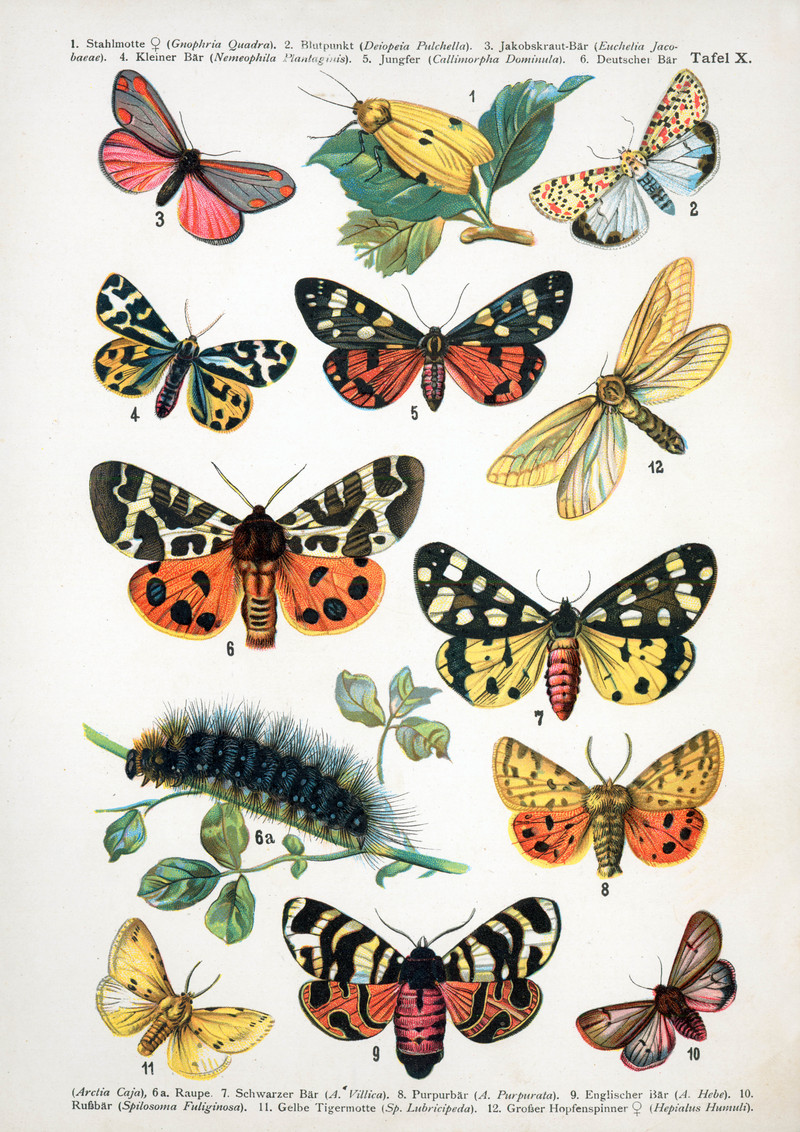|
| Query: Cream-spot tiger | Result: 1st of 5 | |
four-spotted footman (Lithosia quadra), crimson-speckled flunkey (Utetheisa pulchella), cinnabar moth (Tyria jacobaeae), wood tiger moth (Parasemia plantaginis), scarlet tiger moth (Callimorpha dominula), garden tiger moth (Arctia caja), cream-spot tiger moth (Epicallia villica), purple tiger moth (Rhyparia purpurata), hebe tiger moth (Arctia festiva), ruby tiger moth (Phragmatobia fuliginosa), white ermine moth (Spilosoma lubricipeda), ghost swift (Hepialus humuli)
| Subject: | four-spotted footman (Lithosia quadra), crimson-speckled flunkey (Utetheisa pulchella), cinnabar moth (Tyria jacobaeae), wood tiger moth (Parasemia plantaginis), scarlet tiger moth (Callimorpha dominula), garden tiger moth (Arctia caja), cream-spot tiger moth (Epicallia villica), purple tiger moth (Rhyparia purpurata), hebe tiger moth (Arctia festiva), ruby tiger moth (Phragmatobia fuliginosa), white ermine moth (Spilosoma lubricipeda), ghost swift (Hepialus humuli)
| | Poster: | Wiki Photos (---@---.---)
| |

| Resolution: 3850x5450
File Size: 2546612 Bytes
Date: 2008:01:19 18:38:36
Upload Date: 2017:08:19 12:27:05
|
Plate X from Europas bekannteste Schmetterlinge. Beschreibung der wichtigsten Arten und Anleitung zur Kenntnis und zum Sammeln der Schmetterlinge und Raupen (ca. 1895), F. Nemos, Oestergaard Verlag, Berlin, 18 chromolithographische Tafeln, 160 pp.
1. Gnophria quadra = four-spotted footman (Lithosia quadra)
2. Deiopeia pulchella = crimson-speckled flunkey (Utetheisa pulchella)
3. Euchelia jacobaeae = cinnabar moth (Tyria jacobaeae)
4. Nemeophila plantaginis = wood tiger moth (Parasemia plantaginis)
5. Callimorpha dominula = scarlet tiger moth (Callimorpha dominula)
6,6a. Arctia caja = garden tiger moth (Arctia caja)
7. Arctia villica = cream-spot tiger moth (Epicallia villica)
8. Arctia purpurata = purple tiger moth (Rhyparia purpurata)
9. Arctia hebe = hebe tiger moth (Arctia festiva)
10. Spilosoma fuliginosa = ruby tiger moth (Phragmatobia fuliginosa)
11. Spilosoma lubricipeda = white ermine moth (Spilosoma lubricipeda)
12. Hepialus humuli = ghost swift (Hepialus humuli)
Date 21 January 2008
Source http://hdl.handle.net/10013/epic.28790.d001
Author Dr. F. Nemos
Source: https://commons.wikimedia.org/wiki/File:European-butterfly_072-X.jpg
1. Gnophria quadra = four-spotted footman (Lithosia quadra)
The four-spotted footman (Lithosia quadra) is a moth of the family Arctiidae. Lithosia quadra is found in southern and central Europe then east across the Palearctic to the Amur River and Japan. It is also found in the south of Great Britain and Scandinavia.
2. Deiopeia pulchella = crimson-speckled flunkey (Utetheisa pulchella)
The crimson-speckled flunkey or crimson-speckled moth (Utetheisa pulchella) is a moth of the family Erebidae. Utetheisa pulchella can be found in most of Europe, in the Afrotropical ecozone, in North Africa, in the Near East, in the Nearctic ecozone, in the Oriental ecozone, in the Neotropical ecozone and in Australia.
3. Euchelia jacobaeae = cinnabar moth (Tyria jacobaeae)
The cinnabar moth (Tyria jacobaeae) is a brightly coloured arctiid moth, found in Europe and western and central Asia.
4. Nemeophila plantaginis = wood tiger moth (Parasemia plantaginis)
The wood tiger moth (Parasemia plantaginis) is a moth of the family Erebidae. Parasemia plantaginis is found in the Holarctic ecozone south to Anatolia, Transcaucasus, northern Iran, Kazakhstan, Mongolia, China, Korea and Japan. It is also found in North America.
5. Callimorpha dominula = scarlet tiger moth (Callimorpha dominula)
The scarlet tiger moth (Callimorpha dominula, formerly Panaxia dominula) is a colorful moth belonging to the tiger moth subfamily, Arctiinae. Callimorpha dominula is present in most of Europe and in the Near East.
6. Arctia caja = garden tiger moth (Arctia caja)
6a. caterpillar
The garden tiger moth or great tiger moth (Arctia caja) is a moth of the family Erebidae. Arctia caja is found throughout much of the Palearctic, in Europe as far north as Lapland, in Northern Asia and Central Asia, and in North America.
7. Arctia villica = cream-spot tiger moth (Epicallia villica)
The cream-spot tiger moth or cream-spot tiger (Epicallia villica) is a moth of the family Erebidae. Epicallia villica is distributed from the Iberian Peninsula across western and southern Europe, Anatolia, western and northern Iran, West Siberia, Southwest Asia and North Africa.
8. Arctia purpurata = purple tiger moth (Rhyparia purpurata)
The purple tiger moth (Rhyparia purpurata) is a moth of the family Arctiidae. Rhyparia purpurata is found in Europe, Anatolia, Syria, Transcaucasus, Central Asia, South Siberia, Mongolia, Amur Region, northern China, Korea and Japan.
9. Arctia hebe = hebe tiger moth (Arctia festiva)
The hebe tiger moth (Arctia festiva) is a moth species of the family Erebidae. Arctia festiva is found in Central and Southern Europe, Near East, Iran, Central Asia, European Russia, Southern Siberia, Mongolia and China.
10. Spilosoma fuliginosa = ruby tiger moth (Phragmatobia fuliginosa)
The ruby tiger moth (Phragmatobia fuliginosa) is a moth of the family Erebidae. Phragmatobia fuliginosa can be found in the Palearctic ecozone. It is present in most of Europe, in North Africa, Russia, Central Asia, Tibet and in northern areas of North America.
11. Spilosoma lubricipeda = white ermine moth (Spilosoma lubricipeda)
The white ermine moth (Spilosoma lubricipeda) is a moth of the family Erebidae. Spilosoma lubricipeda is found throughout the temperate belt of Eurasia from Europe through Kazakhstan and southern Siberia to Amur Region, China, Korea and Japan.
12. Hepialus humuli = ghost swift (Hepialus humuli)
The ghost moth or ghost swift (Hepialus humuli) is a moth of the family Hepialidae. Hepialus humuli is common throughout Europe. The ghost moth gets its name from the display flight of the male, which hovers, sometimes slowly rising and falling, over open ground to attract females. |
^o^
Animal Pictures Archive for smart phones
^o^
|
|

